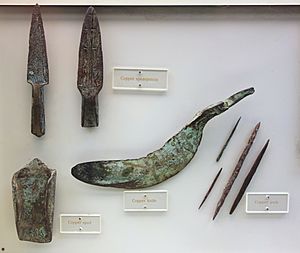Archaic period (North America) facts for kids
The Archaic period is a very old time in North American history. It is also sometimes called the "Meso-Indian period." This period started around 8000 BC and ended about 1000 BC. It is part of the different stages of cultural development before Christopher Columbus arrived.
During the Archaic period, people got their food by hunting and gathering. They ate things like nuts, seeds, and shellfish. This period ended when people started to settle down and farm. Because farming began at different times, the end date for the Archaic period can be very different across the Americas. Other parts of the Americas also had their own Archaic periods.
Classifying Ancient Cultures
This way of dividing history into periods was first suggested by two archaeologists, Gordon Willey and Philip Phillips. They wrote about it in their well-known book in 1958.
In this system, the Archaic period comes after the Lithic stage. It comes before the Formative stage. Here are the main stages in order:
- The Lithic stage (when people first used stone tools)
- The Archaic stage (when people hunted and gathered)
- The Formative stage (when people started farming and living in one place)
- The Classic stage (when large, complex societies grew)
- The Post-Classic stage (the last stage before Europeans arrived)


